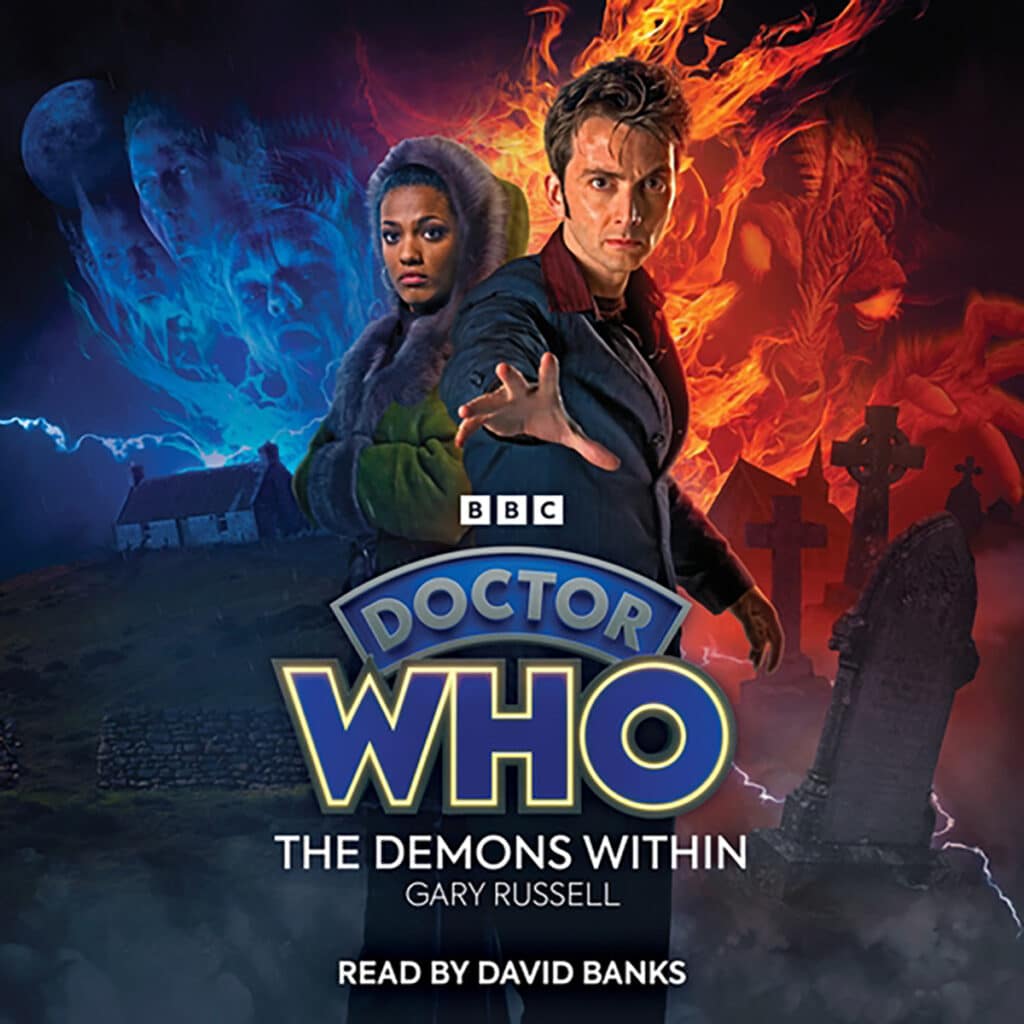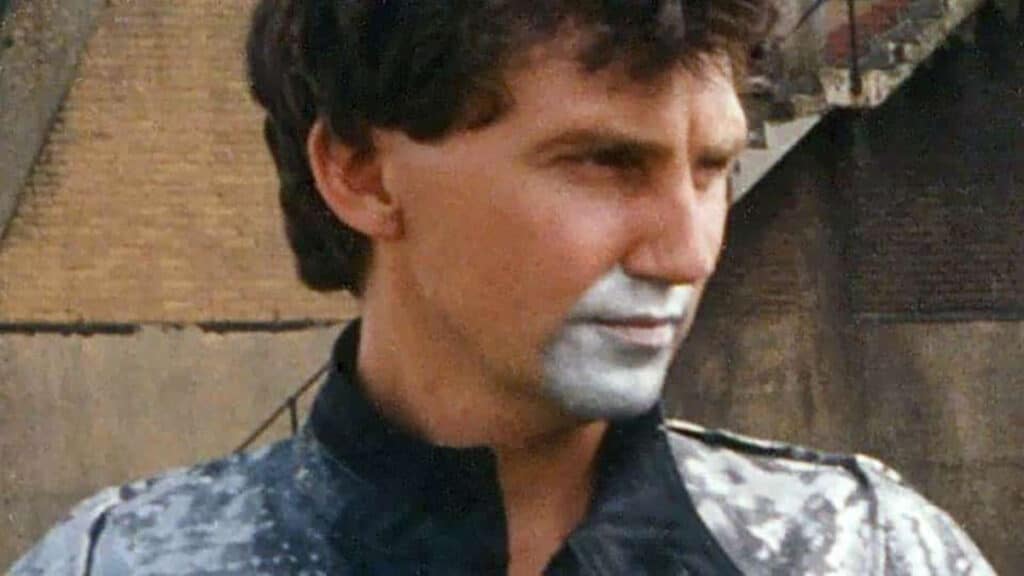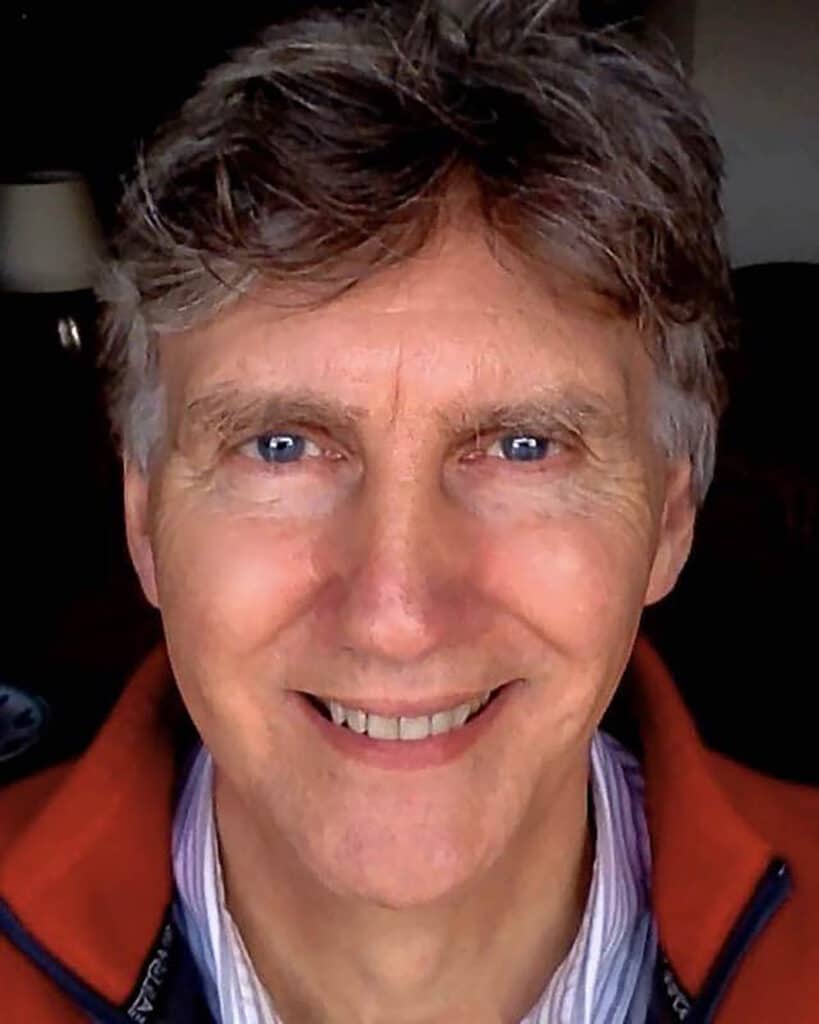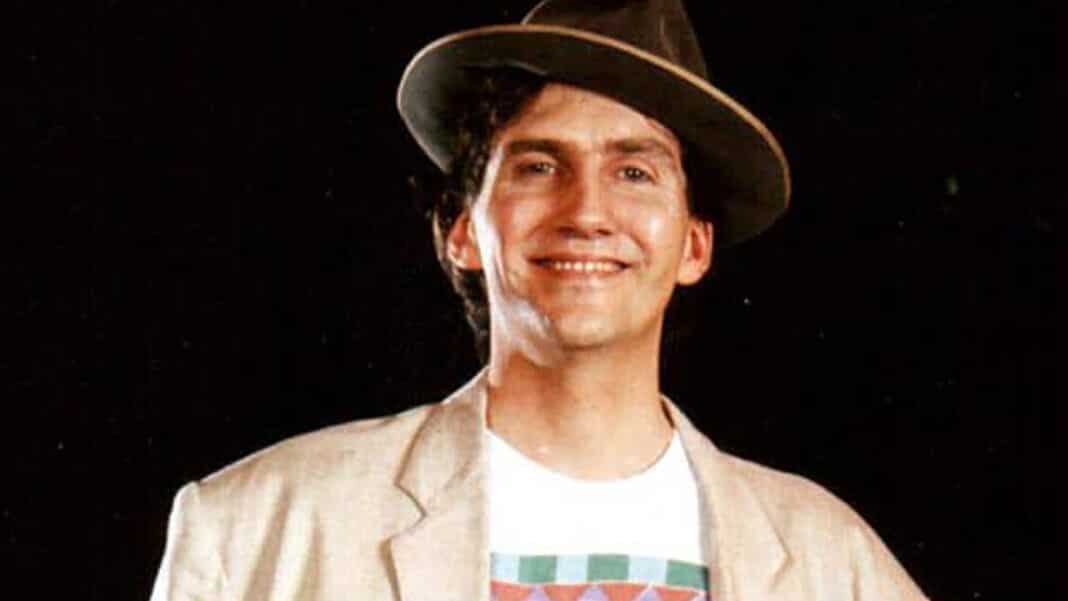David Banks is an actor, writer and director who is strongly associated with ‘Doctor Who’ thanks to his recurring part as the villainous Cyber Leader throughout the 1980s.
On stage and screen, David has worked with five of the original seven Doctors, an achievement only a select few actors can equal. Recently, he has been brought back into the ‘Doctor Who’ orbit, using his distinctive voice to narrate audiobooks. One such title, ‘The Demons Within’, is a short story featuring the Tenth Doctor and Martha that is released next week.
We caught up with David to ask him how he approached the recording of ‘The Demons Within’. We delved into his other ‘Doctor Who’ audiobooks, gathered his thoughts on celebrating the show’s sixtieth anniversary last year and much else besides.
David, it’s great to speak to you. How did you get involved in narrating ‘Doctor Who’ audiobooks?
I’ve been rediscovered by the BBC. Michael Stevens, who’s the Audio Commissioner, got in touch with me in around 1999 when he wanted to make the Cybermen tin CD boxset.
One of the CDs he wanted was the first of the four parts that I did for ‘The ArcHive Tapes’ [documenting the origins of the Cybermen]. It turned out to be extremely successful because I got one of the largest cheques I’ve ever received! In fact, it went to my agent first but I had already left him. He was good enough to send it on.
Did he take his 15%?
[Laughs] Well, he couldn’t really as it was after I left him, but I treated him to a meal. But that’s how I first met producer Michael Stevens, who has earned a tremendously good reputation in BBC Audio. But I didn’t record a book for him until he got in touch about two years ago and asked me to narrate the novelisation of ‘Silver Nemesis’. About six months later, he asked me to do the same for ‘Attack of the Cybermen’. Last autumn, he said that he had some short stories, because we’d reached the end of the novelisations. But he reached out to me as I’ve become one of the stalwarts. Much as I adore ‘Doctor Who’, I’d love the opportunity to get back to reading a wider variety, and work with Michael again on future projects.
‘The Demons Within’ is a good, solid ‘Doctor Who’ story from the reliable pen of Gary Russell. It felt like classic ‘Doctor Who’ to me, with a Victorian setting, creepy old house, humans meddling in things they don’t understand and, of course, a big monster in the basement! What did you make of it?
It has a nice line in in science as well. In fact, it’s fully embedded in a scientific view. We have two scientists who meet the Doctor and Martha. It then becomes spooky. The thing I’ve always enjoyed about audio recordings is that the pictures are so good. Your imagination runs riot and does the job so much better and more cheaply than even CGI.
That’s why I loved reading ‘Doctor Who’ books as a kid! This story felt to me like a Jon Pertwee/Tom Baker one, but with David Tennant’s 10th Doctor leading. Did you find it an adjustment at all moving into the new era of ‘Doctor Who’?
The difficulty for me was finding the voices. But I wonder also whether that’s necessary, because what’s on the printed page is different from what somebody may imagine. The novelisations veered away sometimes from what the actual broadcast story had been. In this case, you’ve just got the story. But the Tenth Doctor is very difficult to capture because he’s so chameleonic. He changes from one thing to another, even his accent!
Well, David Tennant is Scottish, but he plays the Doctor with a kind of cheery Mockney accent. But I thought you captured strongly the way he almost throws away lines and bites through words. The only difference I thought was the fact that your voice is naturally deeper than Tennant’s.
As a reader, I should be able to manage that, but I haven’t heard it back yet. With Martha, I watched a few clips just to get a handle on who she is and how she speaks. It’s an interpretation and you just have to go by the text. You have to understand what the story is, and what the writer is trying to convey.

The banterish nature of the Doctor and Martha’s relationship comes across very well in the writing and in your narration. But I wonder if you enjoyed voicing the demons at the climax of the story, where you get to give listeners a full-throated performance?
I always play baddies for some reason. I long to be a goodie! I’ve done loads of theatre and you’re allowed to do that kind of performance on stage. You’ve got to produce something that one hopes looks natural, can be understood and that brings people in and can command them. On television, you have to do it in different way. For the Cyber Leader it was the fact that the mic was so close to my mouth that it was like a radio performance. Suppose you’re not conveying as much through the face, then it has to come through the voice.
You mentioned earlier the recording of ‘Silver Nemesis’ that you narrated. How did you find approaching the Kevin Clarke’s novelisation as an audio book project?
That was my first foray into the novelisations. I actually hadn’t recorded a book for some time. The last book I’d recorded before that was ‘The Lord of the Rings’, which was 15 years earlier. I’m sure all actors go through this: if you’re not using your experience all the time, then you simply think, “Can I do it? Am I up to it?” And I really thought, “I’m going to accept this challenge that Michael [Stevens] has put before me, but will I produce what he wants? Can I can I get back to doing something with loads of characters and try to make them different?” That was my initial feeling as I was reading through it. But I’m interested in writing style. This is meant to be the representation of what we’ve seen on screen. And yet, it’s different. When people ask what was my favourite story, ‘Silver Nemesis’ is not, because it seemed to me too much of an amalgam of diverse ideas, from Nazism to Cybermen. But I so enjoyed Kevin Clarke’s book. It has an understated humour. And he captures the Doctor very well. Then again, I didn’t think I did justice to Sophie [Aldred], but who could? But with the Seventh Doctor, I felt I knew him well because he was central to my ‘Iceberg’ novel and I lived with Sylvester for a few months when we did a pantomime together in Manchester. He was the Old Faqir and I was the Young Faqir. The witch changes us, you see. So I married Eartha Kitt twice a day! I got to know Sylvester quite well. For that reason, I think I found his voice.
You capture Sylvester’s lightness of delivery very accurately! As you say, there are differences between the novelisation and the televised version but I didn’t mind. It felt like the author was exploring ideas that he might have wanted to put on screen but perhaps for budgetary reasons wasn’t able to. You said that it was difficult getting back in the saddle of recording audiobooks, having done ‘The Lord of the Rings’, but that’s a pretty monumental piece of work, isn’t it? It has so many characters and so many voices, and is such an influential and revered piece of literature. Surely it was something of a pinnacle to record the trilogy back in 2006?
Well, I’ve had a connection with it since I first read it when I was twelve. I’ve read it several times. I love the films. I played Gandalf on the West End in ‘The Hobbit’ in the early 00s. So, I felt an affinity with it. I just love his world. I’ve also recorded the book of Tolkien’s biography [by Humphrey Carpenter]. I remember Tolkien being asked, “How did you write all these characters in the story?” He puffed on his pipe and said, “Well, one’s got to do something with these characters, so I just find something for them to do.” It’s a wonderful, wonderful story. A real classic that spawned a whole industry. When we work so hard on these things, with all that industry and effort, it’s possible to wonder how we actually did it! And then I wonder, “Will I be able to do it again? Can I push that boulder up the mountain again?” That’s the feeling. But I’m proud of it! TS Eliot said, do I dare to eat a peach? Perhaps I ask, “Do I dare to record a book as mighty as that?”
It’s monumental. A solid three days’ worth of listening. It must have been a big chunk of work.
It was every day for six weeks.
I have been enjoying your recent ‘Doctor Who’ audiobooks, but I haven’t heard ‘Attack of the Cybermen’ yet. What was that experience like?
Well, we spoke about ‘Silver Nemesis’ and the novelisations not being entirely reflective of the programmes. The authors I think enjoy the fact that they can embellish, and they can say something else about the characters or the storyline. Eric Saward’s novel is a different view of ‘Attack of the Cybermen’. We thought Paula Moore was the writer when we recorded it. That was a cover for Eric, as he happily admits now. He takes a rather different approach to the characters and the storyline. It starts with Charlie Griffiths, who is a totally different character from Brian Glover’s portrayal. So, you have to ask, was that Eric’s intention in the beginning? Is this how he sees the character? From a literary point of view, for the really forensic ‘Doctor Who’ fan, it’s very interesting to see how the character is treated. That’s just one of the joys I’d say of reading the book and then interpreting it. I knew Brian Glover, and I thought his characterisation was fantastic, and he really brought things down to Earth. Especially when he’s taking off the Cybermen, which is in the book. But it’s different characters with different voices – the gang is from the East End.

I wonder if Eric imagined that criminal gang as a group of Cockneys led by the suave Lytton? Brian Glover brings a different kind of regional voice. He was very much a Yorkshireman, there’s no getting away from that. I recall fondly his Tetley Tea advertisements.
Brian had made quite a name for himself by ‘Attack of the Cybermen’. It was JNT’s [1980s ‘Doctor Who’ producer John Nathan-Turner] intention to bring in people that would be recognised. Brian was a serious actor, but he was a personality as well. And there was an element of personality casting at that time.
I look forward to hearing that one. It’s on my list! You have recorded a lot of audiobooks, albeit with a gap of time in between ‘The Lord of the Rings’ and the recent ‘Doctor Who’ novels and story. Do you enjoy that sort of work? How does audiobook narration compare to working with a company of actors?
In one sense it’s more marvellous than all of them, because you are the orchestrator of it. Producer Neil Gardner is fantastic. He’s moved into audio now, and knows how to shape things. He doesn’t suggest that much at all. But he’s just there and he attends to every detail. So if you if you say something slightly wrong, or you missed out a word, he’ll stop you. Michael Stevens makes sure he listens all the way through very, very closely. Then you get a panel of people to listen along with the text. And if there’s anything which varies from the text, you patch it, or take it out or get the reader to redo that a little bit. Apart from that, you are totally in control. You prepare the material and you’re almost wholly responsible for the interpretation. From that point of view, it’s a very interior world.
And reading is a solitary pleasure, of course.
I’m always wary though of saying what is my favourite or the best. Narrating audiobooks is a way for the actor of performing and having control. But I also love the process of rehearsal with a company of people, and directing. These all have their different experiences and journeys. And sometimes heartaches. The heartache in recording is, “Have I got this voice right?” Colin [Baker] should be easy for me. I’m not sure though – you’ll be able to judge when you hear ‘Attack’. I think I’ve got his energy. There’s something very lovely and interesting about his barrister’s injunction in that he can lay down the law even if he’s wrong! It’s about trying to get into the spirit of these people. And that’s a privilege. I’m paid to do this! It’s an internal monologue but with different voices. Every book contains different characters. Each of those characters needs to sound different in some way, emotionally, perhaps, and consistent so that the reader understands who’s speaking.
It was the 60th anniversary of ‘Doctor Who’ last year. Were you involved in any events?
It was quite a busy year. It began the year before, because I went to TimeLash at Kassel in Germany, taking the train from Amsterdam. Colin [Baker] was there, of course, Colin Spaull and Dean Hollingsworth, whom I’d never met, but we were a kind of double act like the Chuckle Brothers! Frazer Hines was there, and Michael Bryant. When we had dinner that evening, Michael was next to me. We’d not met before, but we really got on. So that was the start of the celebrations. Just a few months before that I recorded the interview for ‘The Secrets and Scandals of Doctor Who’, a film that came out at the tail end of the celebrations. I did quite a long interview. Sophie [Aldred] was going in after me and we had really good natter. But when I saw it, I’m only in about two clips. Perhaps I didn’t have enough scandal! I was asked about JNT but he was fine with Mark [Hardy] and me. They didn’t go into very much in the film. Then there was the BFI premiere of ‘The Five Doctors’. Peter [Davison], Janet [Fielding], Mark [Hardy] and I were there for it. Frank Skinner was in the audience because he’s an absolute fan. So that was a joy. Regenerations at Swansea was my first invitation there. Several people had told me it’s such a good place and event. Sylvester [McCoy] was there, Anneke Wills, and Wendy Padbury who I hadn’t seen for ten or fifteen years. I spent a good amount of time chatting to Peter Purves, and to Matthew Waterhouse, who can be quite shy.
Well, you did bump him off in ‘Earthshock’.
You’re right. I did kill him off. He’s always fearful of me! Terry Molloy [Davros] and I had a wonderful double act. We were the first on for the interviews. Terry had a walking stick and I was worried about him, and I helped him up a few steps. And then he did a little jig once he got onto the stage, which got things going and broke the ice. I had a signing with Michael Kilgarriff, Christopher Robbie and Mark [Hardy]. After that I did my Cyber talk at St John’s College, Oxford. It leans into climate change, and how we’re changing ourselves in the same way as the Cybermen had to. We will need our own personal exoskeletons for survival.

Was the talk well-received?
Yes. I do this talk from time to time, but it always happens to be at universities. It’s not academic, really, although it’s treating seriously, as I’ve tried to do in my Cybermen book, the mythos of ‘Doctor Who’. What the stories are pointing to, rather than just the personalities. The Cybermen myth is very rich one, and it applies to us. Kit Pedlar saw that so early.
What projects do you have coming up or that you’re working on at the moment?
Well, because I’m in Amsterdam, quite a lot. I’ve been working with a company of Dutch actors. But also, I’ve got a connection with a professor at Princeton. And he brings over from time to time a group of students. The idea that I discussed with him was to provide some kind of theatrical comparison between Dutch theatre and English. This is the what they call in academic circles the early modern period, from the 17th century. I produced a Dutch farce and a one-man King Lear, which we shoehorned into one evening. It worked extremely well. I’m researching a two-hander. The literal translation of the Dutch is ‘Simon Without Sweetness’. I can’t find another example of a play from the period with only two characters. It’s a very unusual play and yet it’s not recognised or known. I’ve translated the old Dutch into English using ChatGPT which is very literal. I’ve been adapting that and making it into something that I feel is fully performable by English actors. I’m now at the stage where I hope to do workshops, and maybe even put it on.
Would that be in the UK or Amsterdam?
I’m hoping in both, and that it becomes a way of opening up a Dutch play and Dutch attitudes to an English-speaking audience.
I wish you all the very best with it, David. It’s been great to catch up with you. Thank you for talking to us today.
Thank you!
See our review of ‘Doctor Who: The Demons Within’. You may also enjoy our previous interview with David Banks and review of ‘The ArcHive Tapes’.
Purchase ‘Doctor Who: The Demons Within’ on CD or digital, and see also David Banks’ recordings for ‘Silver Nemesis’, ‘Attack of the Cybermen’ and ‘The ArcHive Tapes’.


